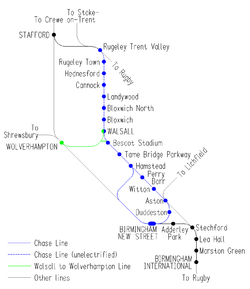Walsall to Wolverhampton Line
| Walsall-Wolverhampton Line | |
|---|---|
|
Diagram of the line (in green) in relation to the other railways in the area. | |
| Overview | |
| Locale |
Wolverhampton Walsall West Midlands (region) |
| Operation | |
| Owner | Network Rail |
| Technical | |
| Track gauge | 1,435 mm (4 ft 8 1⁄2 in) standard gauge |
The Walsall to Wolverhampton Line is a railway line in the West Midlands, England. It connects the town of Walsall to the city of Wolverhampton. The line does not currently have any scheduled passenger services, although it has had in the past. At present, the main use of the line is by freight trains avoiding Birmingham New Street. It is also used as a diversionary route when engineering works are carried out on the West Coast Main Line.
History
Most of the present route was opened in 1837 as part of the original Grand Junction Railway, one of the first railway trunk routes, it later came under the control of the London and North Western Railway, then the London, Midland and Scottish Railway and later British Rail in 1948.
The line's strategic use as a freight and diversionary route led to it being electrified with overhead wires in the 1960s, as an offshoot of the West Coast Main Line electrification, along with the connecting Walsall Line. However the local passenger service was withdrawn in 1965 as part of the Beeching Axe, and the line's intermediate stations at Darlaston, Willenhall and Portobello were closed.
Recent history
A passenger service was reintroduced 1998, however this was not a success and was withdrawn again in 2008. The service, which was funded by Centro and operated by Central Trains (later London Midland), operated hourly, and was reintroduced to the line on 24 May 1998. However, in 2005 the Strategic Rail Authority proposed the withdrawal of the service, citing low passenger numbers and a lack of rolling stock.[1][2] Centro opposed this, and the service was given a temporary reprieve. There were also proposals to reopen the stations at Willenhall Bilston Street and Portobello to increase passenger numbers and the viability of the service. During the early-mid 2000s, the line was used as part of an hourly service between Walsall and Wellington. But these services were withdrawn in 2006 and the service was reduced to an hourly service between Walsall and Wolverhampton, with only one or two trains per day in each direction extending to Wellington in the early morning and late at night.
It was announced in July 2008 that the government was withdrawing funding for this service,[3] and as a result the route was closed to passengers as of December 2008. However the line remains open for freight trains, and will also be used as a diversionary route when the West Coast Main Line is closed for engineering works. Between 2008–2011 the line was also used by the now defunct Wrexham & Shropshire passenger services to London.
The full service was withdrawn on 13 December 2008, although there is still a 'Parliamentary train' – initially, one train per day ran directly from Walsall to Wolverhampton on weekdays, leaving Walsall at 19:36, but this was replaced in the 19 May 2013 timetable by a Saturdays-only train from Wolverhampton to Walsall leaving Wolverhampton at 06:38. There is also a service between Besot Stadium and Wolverhampton on Saturdays as well not via Walsall, using the other track direct to Bescot Stadium.
A service calling at all stations via Birmingham New street now operates, taking over 1 hour, compared with 12 minutes for the direct service, and London Midland advise passengers to use the 529 bus service instead.[2]
References
- ↑ "Walsall-Wolverhampton TRAINS". South Staffs Railway. Retrieved 13 March 2015.
- ↑ 2.0 2.1 "Fight to save under threat rail service". Walsall Observer. 2008-07-11. Archived from the original on 13 February 2012. Retrieved 2008-07-16.
- ↑ "Funding for rail service removed". BBC News. BBC. 25 July 2008. Retrieved 13 March 2015.
External links
- Walsall Transport strategy
- London Midland website
- BBC Black Country: Have your say on the rail line closure
| ||||||||||||||||||||||||

